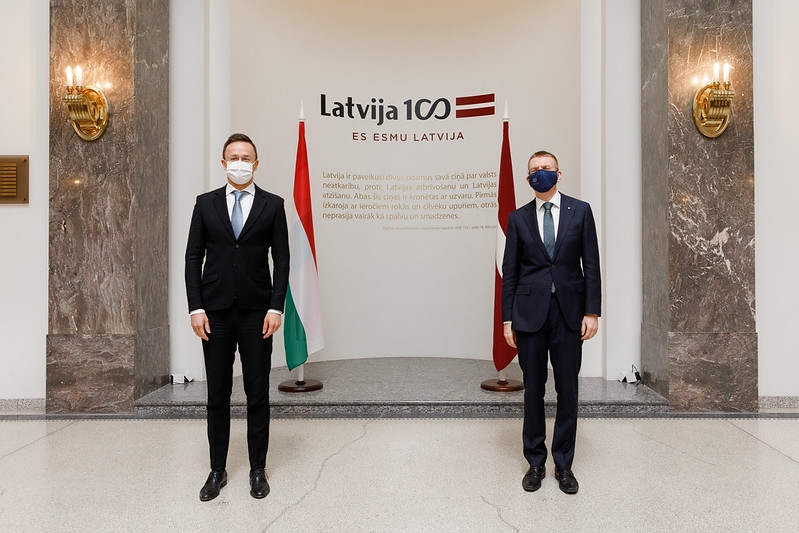On 5 March 2021 in Riga, the Latvian Foreign Minister, Edgars Rinkēvičs, met with the Minister of Foreign Affairs and Trade of Hungary, Peter Szijjártó, who was in Latvia on a working visit.
Edgars Rinkēvičs and Péter Szijjártó shared views on bilateral relations, security policy and regional cooperation, and current policies pursued by the European Union and neighbouring countries. Foreign Minister Szijjártó presented priorities of Hungary in its upcoming Presidency of the Council of Europe’s Committee of Ministers.
Edgars Rinkēvičs commented positively on the good bilateral relations between Latvia and Hungary and he thanked Hungary for its involvement in NATO’s collective defence measures in the Baltic region including a decision to continue its engagement in Baltic Air Policing missions taking place in 2022 and 2025.
The Latvian Foreign Minister welcomed Hungary’s decision to change its status as an observer at the NATO Strategic Communication Centre of Excellence in Riga to one of permanent representation thereby considerably increasing its contribution to the centre’s work.
In 2021, both countries mark two milestone events: the centenary of the establishment of diplomatic relations and the 30th anniversary since regaining independence. The officials expressed their hopes that an improved epidemiological situation would make it possible to carry out an exchange of cultural projects.
Foreign Minister Rinkēvičs underlined that regular contacts in regional cooperation, an exchange of views in the format of the Baltic States and the Visegrad Four, participation in the Three Seas Initiative, and dialogue in multilateral formats are important for enhancing the relationship between Latvia and Hungary.
Opinions were exchanged on the topics high on the agenda of the European Union and its neighbours: cooperation during the COVID-19 crisis, the rule of law, Europe’s future, migration, the mobility package, the Multiannual Financial Framework, climate and energy. The Ministers agreed that cooperation between the countries and support for neighbours during the epidemiological crisis is an essential factor in restricting the pandemic. Public health is the top priority. It can be guaranteed by a timely deployment of vaccines and effective vaccination strategies. At the same time, it is essential to ensure smooth functioning of the Single Market.
The Ministers in line with the EU FAC decision expressed their positions on violations of democracy and human rights in Belarus and Russia and concerning coordination of support for the Eastern Partnership countries.





